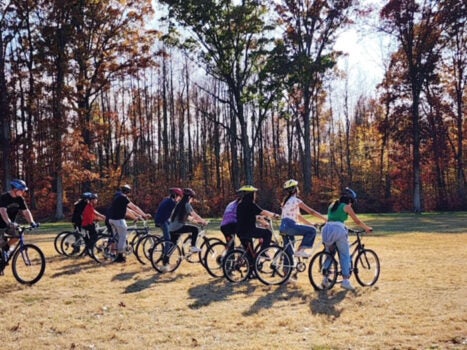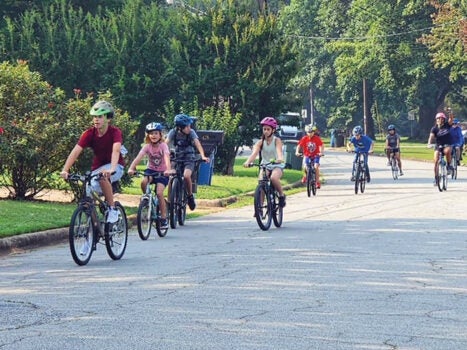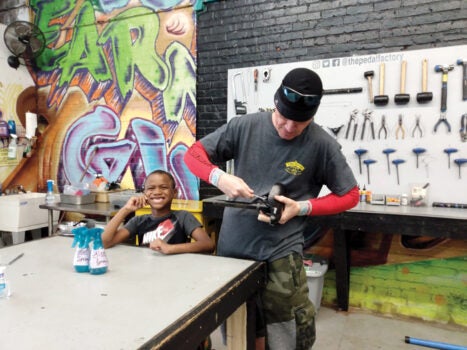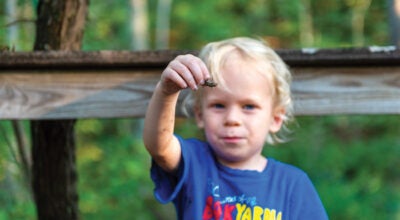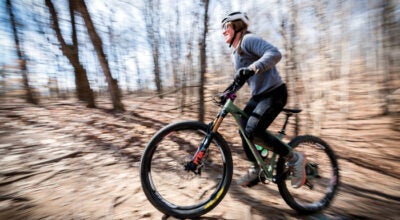Spirit of Rowan: Rolling out cyclists: Pedal Factory aims to make bikes accessible to everyone
Published 12:00 am Sunday, March 24, 2024
Making bikes accessible to everyone, whether they are used for transportation, recreation or to improve one’s health, is the mission of The Pedal Factory, a nonprofit community bike center.
To accomplish its mission, the organization depends on the community’s support for the most part, along with seeking some grants, said Mary Rosser, executive director and one of the founding members.
Rosser is also a member of the current board of directors along with her husband, Todd Rosser, Sharon Earnhardt, Bob Paolino, Bill Feather, Justin Oppman and Elizabeth Trick.
They have been in existence as an organization since October 2015 and set up shop on South Main Street. Needing more space both for bikes and a place to work on them, plus having some building issues necessitated a move, and the center is now located at 311 E. Council St., Salisbury.
“This spot really fulfills the need for space,” Rosser said, plus they have space upstairs for additional bikes they receive through donations. “All the bikes that are here have been donated. We don’t have any new bikes,” she said, and they use the grants to buy items like “tools and new parts that are necessary for repairs, and then we, through the years, kind of evolved to sell used bikes that are refurbished, and just random other things that are donated and that helps us to stay afloat and helps the community in general.”
The nonprofit got its start, Rosser said, when she and her husband met several others on a bike ride, and they began talking about how Salisbury was an easy place to ride bikes and the fact that many rode bikes as their mode of transportation because it was the only way they had to get around.
Because of this, Rosser said it would be great to have a place where people could access a bike, make sure they are safe, and have access to needed tools and equipment.
Since the start, getting bikes or necessary parts into the hands of those who need them has been done through its Earn A Bike Program. Over time, the program has changed, but it “continues to be the heart of our organization,” she said.
The program allows individuals to come to the shop, volunteer some time and learn how to work on bikes, and it becomes theirs.
“We have evolved that because we wanted to make sure that people really understood how the nonprofit works, so we asked people to do some volunteer service by doing some things that help us stay afloat and then really make sure that people get some education on taking care of their bike and riding safely and once they get through the checklist, they come away with a bike, a helmet and a lock and a set of lights and there’s no cost for any of that,” Rosser said.
As for volunteering and learning how to work on a bike, she said it’s whatever they feel comfortable with or the needs at the shop when they are there, which could include moving inventory or pumping tires.
But she did share they want everyone to learn the basics of caring for their bikes, like knowing how to check the air in their tires and pump them, making sure the brakes work and their chain and knowing “when things need to be looked at and when things can be fixed” and not just throwing it aside thinking it’s broken and not fixable.
The Earn A Bike program may vary for those younger than 13 in that volunteer service is not required, but they can participate if they want to.
For the younger recipients, Rosser said they want to teach them how to identify the different parts of the bike and how to take care of it and learn where they plan to ride it and their thoughts about the bike.
Staff mechanic Tim Faucette helps everyone go through the Earn a Bike program, “and he’s become a very valuable part of the shop,” she shared.
Those wishing to make a donation of a bike or parts can drop them by the shop whenever they are open, including Tuesday and Wednesday from noon to 6 p.m., Thursday from 4-8 p.m. and the first and third Saturdays from noon to 4 p.m.
Don’t worry about the bicycle’s condition, Rosser said, as they will take any salvageable parts, and those that are not, they recycle and can earn money from those to help the center as well.
No bike to donate? They also have a place on their website for online donations, which she said is “super helpful. It’s always a struggle to keep paying the rent and the utilities, and there are expenses that go with it,” along with paying staff members as they are not able to just be a volunteer-run organization as they were to begin with.
Volunteers are also welcome, and service hours can be logged.
“For each hour of volunteer service, that’s worth $5 of shop credit exchangeable for used parts or repair, anything like that,” she said.
When it comes to bicycles, The Pedal Factory furnishes more than the actual bikes themselves, as events are also offered, providing the community the chance to get out and ride and teaching those who don’t feel comfortable on a bike so they can gain confidence.
One such event takes place every Sunday as the center offers a social ride that leaves from the shop at 2:30 p.m. and lasts approximately an hour.
In the summer, when the weather gets warmer, Rosser said it might change to a morning ride, but it’s always on a Sunday.
The ride, which she said is designed to help people feel comfortable on a bike and as a way to encourage people to get out, is described as being “low key, conversation pace with nobody’s left behind. We stay together as a group and just ride locally so that people get familiar with riding in town because it’s not a bad place to ride.”
Additional events held by The Pedal Factory, in partnership with the city or another organization, include some Learn to Ride events designed for all ages. Some in the past have been held at Dan Nicholas Park and Essie Academy during which time the center took balance bikes and taught people how to ride, first, Rosser said, by learning to balance and then progressing to pedaling. We try to offer those a few times a year based on the funding.”
Community rides are also offered by the center, as she noted they had one at Halloween and, just recently, one for Black History Month.
Summer camps are another event they have done in the past; however, at this time, she said, that was not going to be a possibility this year.
The Pedal Factory also partners with the city to help manage the trails at the Salisbury Community Park.
“We have a couple guys that are not official board, but they are trail care crews,” Rosser said. “They work with the city, and then we try to seek grants and seek volunteers to help them out as far as the trail-building efforts go.”
Unsure of the exact number of bikes on hand, Rosser said with a laugh there were lots, and “they’ve all been donated, and it’s wonderful.”
There’s lots going on at this local nonprofit, with learning opportunities and community events, but Rosser said the most important aspect of the shop for her is they are “basically creating cyclists, and we look at every person as a cyclist. We’re trying to make this a place where everybody feels like they belong and have something to offer as far as volunteer service, whether you know how to work on a bike or not. Everybody can participate in this space.”


